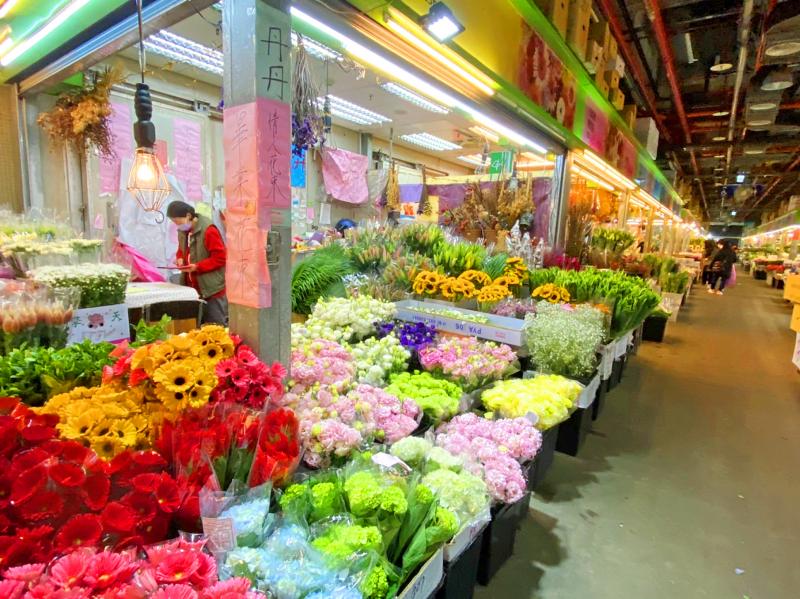A trial run of a flower cold chain covering Taiwan has been completed and is ready for use, but the additional costs would be reflected in prices, the Taipei Flower Market said on Thursday.
Heat, which flowers are often exposed to while being transported, causes yellowing and wilting, prompting the market to push for a cold chain.
Taipei Flower Sales Ltd, which runs the market, said that it has purchased trucks with temperature monitoring and control capabilities that have facilitated cold chain transport of flowers from growers to the market.

Photo: Yang Hsin-hui, Taipei Times
Chang Yu-wei (張育瑋), director of the Taipei Market Affairs Department’s retail division, said that the upgrade was made in stages, starting with storage at the market before tackling transportation.
Without cold chain supply, flowers would only last two to three days after arriving at the market, but with the system, they can last up to a week, Chang said.
Taipei Flower Sales said that it collaborated with the Nantou County Government, the Taichung City Government and the Agriculture and Food Agency to establish the logistics network nationwide.
Without such a system, Taiwan’s flower industry — which has 14,520 hectares of production and is valued at NT$17.6 billion (US$635.61 million) — cannot compete internationally, Agriculture and Food Agency Director Hu Chung-yi (胡忠一) said.
The cold supply chain is complex, as the flowers have to be prepared after they are picked — with different packaging required depending on the flower — then transported to Taipei, where nearly half of the nation’s flower transactions occur, Taipei Mayor Ko Wen-je (柯文哲) said.
Taipei Flower Sales chief executive officer Chang Tang-mu (張堂穆) said that the system, while yielding fresher flowers, would also bring higher prices.
However, the company would try to enforce a 10 percent cap on price fluctuations, he said.
There are two routes, one with two trucks from Taichung’s Houli (后里) and Sinshe (新社) districts, and one with five trucks from Nantou County’s Puli Township (埔里), with both systems ending in Taipei, he said, adding that the company is in talks to purchase more trucks to increase the transportation rate.
Chang Yu-wei said that deliveries via the cold chain would reach 35 percent of overall supply, while the company and its collaborators would continue to develop the system.
The cold chain supply would boost flower sales, he said.

Nipah virus infection is to be officially listed as a category 5 notifiable infectious disease in Taiwan in March, while clinical treatment guidelines are being formulated, the Centers for Disease Control (CDC) said yesterday. With Nipah infections being reported in other countries and considering its relatively high fatality rate, the centers on Jan. 16 announced that it would be listed as a notifiable infectious disease to bolster the nation’s systematic early warning system and increase public awareness, the CDC said. Bangladesh reported four fatal cases last year in separate districts, with three linked to raw date palm sap consumption, CDC Epidemic Intelligence

Two Taiwanese prosecutors were questioned by Chinese security personnel at their hotel during a trip to China’s Henan Province this month, the Mainland Affairs Council (MAC) said yesterday. The officers had personal information on the prosecutors, including “when they were assigned to their posts, their work locations and job titles,” MAC Deputy Minister and spokesman Liang Wen-chieh (梁文傑) said. On top of asking about their agencies and positions, the officers also questioned the prosecutors about the Cross-Strait Joint Crime-Fighting and Judicial Mutual Assistance Agreement, a pact that serves as the framework for Taiwan-China cooperation on combating crime and providing judicial assistance, Liang

Reports of Taiwanese going missing, being detained or interrogated, or having their personal liberties restricted in China increased about fourfold annually last year, the Mainland Affairs Council (MAC) said yesterday. Last year, 221 Taiwanese who traveled to China were reported missing, were detained and interrogated, or otherwise had their personal freedom restricted, up from 55 the previous year, the council said. Reopening group tours to China would be risky, as it would leave travelers with no way to seek help through official channels after Beijing shut down dialogue between the associations tasked with handling cross-strait tourism, the MAC said. Taipei’s Taiwan Strait Tourism

SHIFT: Taiwan is evolving from a transit stop into a tourist destination, with more international travelers willing to spend on tours, dining and cultural activities Taiwan rose three places in the World Tourism Barometer to 36th globally in 2024, with international tourism revenue of US$10.028 billion, the Tourism Administration said on Monday. The UN Tourism Organization publication said that its focus has switched from whether a country has returned to pre-COVID-19 levels of tourism to the amount spent by a tourist during an overseas trip. The nation last year welcomed 8.57 million international tourists, about 9 percent more than in 2024, with most tourists coming from Japan, South Korea, and Hong Kong and Macau, all of which accounted for at least 1 million tourists each. During the first